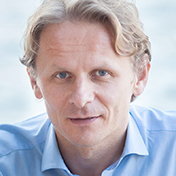
Ivan Dikic, MD, PhD
Ivan Đikić is a leading expert in ubiquitin biology and autophagy, internationally recognized for uncovering how disruptions in these pathways drive human diseases, including cancer, infectious diseases, and neurodegeneration. His recent research focuses on mechanisms of endoplasmic reticulum remodeling and on the discovery of novel proximity-inducing therapeutics, including PROTACs and molecular glues.
He is Professor of Biochemistry and Director of the Institute of Biochemistry II at Goethe University Frankfurt, and a Fellow of the Max Planck Institute for Biophysics. Trained as a medical doctor in Zagreb, Croatia, Đikić earned his PhD under the supervision of Joseph Schlessinger at New York University, USA. From 1997 to 2002, he served as Group Leader at the Ludwig Institute for Cancer Research in Uppsala, Sweden. He joined Goethe University in 2003, became Director of the Institute of Biochemistry II in 2009, and was Founding Director of the Buchmann Institute for Molecular Life Sciences (2009–2013). In 2018, he co-founded the Frankfurt Cancer Institute.
Since 2016, he has led the Collaborative Research Centre (CRC) on selective autophagy. More recently, he established and directs PROXIDRUGS, a large research consortium uniting academic and industry partners to develop next-generation therapeutics based on proximity-inducing mechanisms for targeted protein degradation.
Ivan Đikić is an elected member of EMBO, the German National Academy of Sciences Leopoldina, Academia Europaea, and the American Academy of Arts and Sciences. His scientific contributions have been recognized with numerous prestigious awards, including the Louise-Jeantet Prize for Medicine, the Hans Krebs Award, the Jung Prize for Medicine, and the Leibniz Prize. Deeply committed to the education and mentorship of future generations of scientists worldwide, he has also been honored with Croatia’s highest civilian state decoration, the Order of Duke Branimir, bestowed by the President of Croatia.